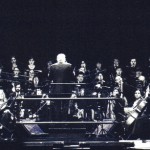“Dear friends, I am pleased to get in touch with you through Twitter. Thank you for your generous response. I bless all of you from my heart.”
Pope Benedict XVI’s much-anticipated arrival in the Twitterverse this morning caused quite a commotion. And there is doubtless a great deal more to be said in the coming days. I must admit to some puzzlement at his willingness to enter this particular fray in the first place.
Twitter’s an odd and unforgiving duck — an “If you’re not too long, I shall wait for you all my life, but what’ve you done for me lately?” sort of place. The predictably ugly vitriol that poured forth within hours of the initial announcement was demoralizing (to me, at least). And #AskPontifex, the hashtag encouraging direct communication between the Pope and his Twitter followers, is as mixed a bag as anything I’ve ever seen. (I heartily endorse Tom McDonald’s advise: “Don’t hit the “expand” box on his Tweets.” Seriously. Don’t do it.) Yet at the same time, the response points to why this sort of New Evangelization is such an opportunity.
How can we celebrate the Year of Faith better in our daily lives? “By speaking with Jesus in prayer, listening to what he tells you in the Gospel and looking for him in those in need.”
If someone were to sit me down in front of the Pope and say: “Go ahead. Ask Papa Benedetto anything you want, ” I’d probably swallow my tongue. Right after swallowing my heart, which would be in my throat. So the answer to “What Question Would You Ask the Pope in Person” would probably be something like “BLERUGHNYUZCTO?” (Only something considerably less articulate.)
But “What Question Would You Ask the Pope Online?” From the relative privacy and safety of my home computer? That’s an entirely different barrel of fish.
I’d love to ask him about one of our shared passions: classical music (especially Mozart). Or to ask him about vocations — a question which, as a father of six(ish) boys, is never far from my mind. But my first question for the Pope (if I ever found the courage) would be something much more basic. And much more complicated.
“Who are you?”
Not “Who are you in the context of the Church’s hierarchy?” Not “Where do you come from and how did it shape you?” And not “What philosophical and theological principles most enform and encapsulate your thoughts?” No, what I want to know is “Who are you? You, yourself?”
Is Twitter the right place for such a question? Perhaps not. But it’s a new and unknown weapon in a battle Benedict has been waging since the day of his election.
To me, his greatest challenge upon ascending to the Chair of Peter has always been following hard upon the footsteps of one of the most personally charismatic men the modern world has ever seen. We knew who John Paul II was. Benedict? We knew a great deal about his thought — perhaps more than any pope in recent memory. We were equally well-versed in his efforts on the Church’s behalf. And those initial impressions have been emphatically enforced in the ensuing years. But the man himself was (and remains) largely unknown to us.
How can faith in Jesus be lived in a world without hope? “We can be certain that a believer is never alone. God is the solid rock upon which we build our lives and his love is always faithful.”
There is a great deal of affection, devotion, and (as Twitter showed these past few days) hatred directed Benedict’s way as a result of his position as Successor of Peter. But he is undeniably a quieter, more subdued man than John Paul II, and that makes him harder to know and to appreciate. That’s where #AskPontifex comes in.
Any suggestions on how to be more prayerful when we are so busy with the demands of work, families and the world? “Offer everything you do to the Lord, ask his help in all the circumstances of daily life and remember that he is always beside you.”
Evangelization (New or otherwise) can never be truly abstracted from the one doing the evangelizing. The great opportunity presented by the technology that surrounds is us not the chance to mass-market and disseminate our views to a global audience, but to reach out to particular individuals that would otherwise never have heard our voice (or had their own voices heard). Evangelization happens on a personal, individual level, not an institutional , universal one. In the midst of all the sturm und drang of #AskPontifex, there are ordinary, everyday human beings wanting and waiting for the eTouch of Papa Benedetto.
Many Twittering gongs would rather pontificate (pardon the pun) to their echo chambers of followers than engage in meaningful conversation. Sadly, I count myself among them. But Benedict doesn’t want to pontificate; he wants to proselytize. And to do that — to do it effectively — people need to know who he is.
And that’s why he’s come to Twitter. He, himself.
Attribution(s): Photos courtesy of Getty Images, which allows the use of certain images “as long as the photo is not used for commercial purposes (meaning in an advertisement or in any way intended to sell a product, raise money, or promote or endorse something).”












